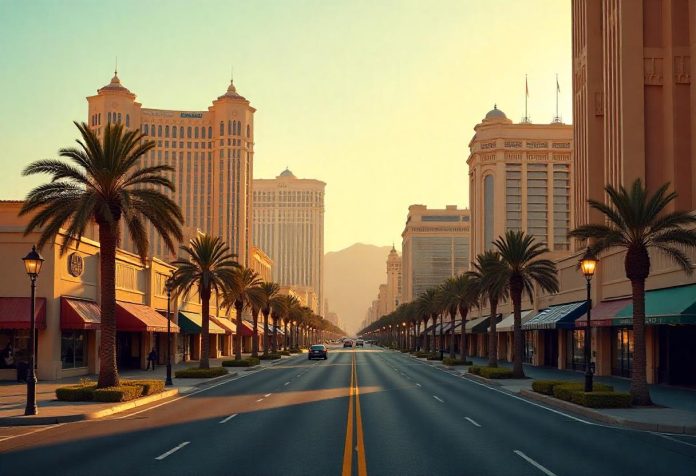Tuesday, July 15, 2025

Las Vegas Becomes a Global Luxury Destination, With Quiet Retreats and Non-Gaming Activities
Formerly known for cheap hotels and all-night casino revelry, Las Vegas is undergoing an identity makeover. The mass market-driven metropolis founded on casinos is recasting itself as a luxury destination. Las Vegas is no longer just a playground for high-rollers, but is attracting a new class of traveler interested in refined options, high-end retreats, and tranquility.
From Budget Appeal to High-End Retreats
Old Las Vegas hotel plan was simple: attract hordes of budget-conscious tourists in low-cost rooms and parade them onto the casino floor. The resort was based on affordable accommodations, all-you-can-eat buffets, 24/7 chemin de fer, and splashy productions appealing to those in need of an inexpensive quick vacation.
That’s an antiquated formula. Las Vegas is heading the exact opposite today, in a much higher-end direction, where high-end hotels and upscale facilities are becoming the focal point. Luxury construction and redevelopment of old-style casino hotels is no longer done in the name of comfort, wellness, and higher-end experience but is abandoning the old ideals of mass appeal and gaming.
Non-Gaming Luxury Hotels Become Most Popular
Maybe the most striking example of such a shift is the Waldorf Astoria Las Vegas. As the number one hotel in the city as rated in Travel + Leisure‘s 2025 World’s Best Awards for the second consecutive year, the Waldorf Astoria is a perfect exemplar of the new, quiet luxury Las Vegas is becoming. The non-gaming, non-smoking hotel is an entirely different proposition from the old Las Vegas resorts.
As a substitute for reliance on casino revenues, the Waldorf Astoria lures guests with high-end amenities in the form of a 27,000-square-foot spa, peaceful pool area, upscale dining, and fine service. With room starting prices in the range of roughly $225 per night (prior to resort fees), the hotel offers a very attractive alternative for guests demanding a five-star experience without all the hustle and bustle that a casino brings.
The Waldorf Astoria’s inclusion in national travel lists is indicative of the new wave of travelers seeking wellness-based, customized encounters in a less frantic atmosphere, removed from the typical hustle and bustle of the Strip.
Redefining the Vegas Experience
As Travel + Leisure‘s enormous poll of nearly 180,000 readers suggests, Las Vegas’ best hotels today are those that focus on quality, design, value, and good service — less, perhaps, on gambling. Other luxury hotels, such as Vdara and Four Seasons Las Vegas, are not behind and subscribe to an identical mantra of treating guests to a luxury, non-gambling experience.
This is a paradigm change in traveler requirements. Rather than sheer entertainment-seeking on the playing floor, modern guests are requiring multi-faceted, well-designed experiences that blend relaxation, high-end dining, and entertainment — and do so occasionally without ever setting foot in a casino.
A Hub for Traveling with Differing Interests
Vegas is no longer for gamblers only. The Las Vegas Strip is also a cosmopolitan hotspot for business conferences, upscale shows, and high-profile sporting events, which attract an eclectic crowd.
The “bleisure” phenomenon, in which a traveler melds business and pleasure in the course of a single trip, is on the rise, and Las Vegas is now one of the top U.S. cities for such travel. Las Vegas has tremendous convention facilities, direct-flight access, and upscale accommodations making the destination an appealing destination for both the business traveler as well as for those seeking an array of leisure activities.
Massive stadiums like Allegiant Stadium and T-Mobile Arena are home to high-profile sporting events, concerts, and productions, further widening the appeal of the region. The events attract people from all around the world, further enhancing Las Vegas’s reputation as a destination about much more than casinos.
The New Luxury Standard in Las Vegas
As travelers’ demands shift, so do the hotels of the city. Resorts World Las Vegas and the Fontainebleau, the new high-end hotels, are spearheading the movement for modern high-end hospitality. The hotels do not aim to provide a place to sleep, but a whole itinerary for dining, artwork, relaxation, and entertaining, all without the need to gamble.
At these hotels, guests can expect an individualized experience: attending a conference in the morning, indulging in spa treatments in the afternoon, dining at iconic restaurants in the evening, and attending a big production — all without ever setting foot on a casino floor. For guests still seeking old-school Vegas thrills, casinos are always in the vicinity but no longer front and center.
The Future of Las Vegas Hospitality
Redeveloping Las Vegas as a high-end retreat for discerning tourists is a distinct departure from its old identity as a value-driven, casino-based tourist destination. The appeal of non-gaming hotels, spas, and private luxury travel is but an indication of a broader hospitality trend: tourists nowadays appreciate relaxation, comfort, and unique, high-end experiences.
It’s not a passing trend but an intentional shift in course. Las Vegas is rebuilding itself as an international luxury destination for professionals, families, wellness enthusiasts, and anyone seeking something besides neon lights and blackjack tables. The city now offers a higher, wider definition for an experience in Las Vegas that’s unforgettable.
In 2025 and beyond, guests can still experience the iconic Vegas atmosphere if they desire, but they can also retreat to serene oases, loll in luxurious spas, dine at Michelin-rated restaurants, and savor personalized moments that make Las Vegas a destination for a new era’s traveler.
